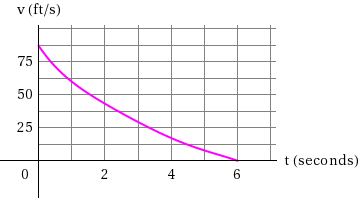When you apply the brakes we all know they produce a net force backwards so we all know the resultant force is acting backwards. But when the resultant force acts backwards it does not mean that the object should travel backwards.
At the instant the brakes are applied, the object has a certain velocity, let's take it as $V_1$ which is positive, assuming the car moves backwards at the same instant, meaning it should have a $V_2$ which is negative. (Note that: velocity is a vector, so the direction is really important.) This situation causes the object to have an infinite deceleration, considering the resultant force stays constant.
- Deceleration can never be infinity.
- Once the object has a velocity, it will never travel backwards, because friction is an opposing force when there is motion. Now there is no motion, so no friction. Therefore no resultant force resulting in no motion.
Normally a graph for velocity when braking is like this.

